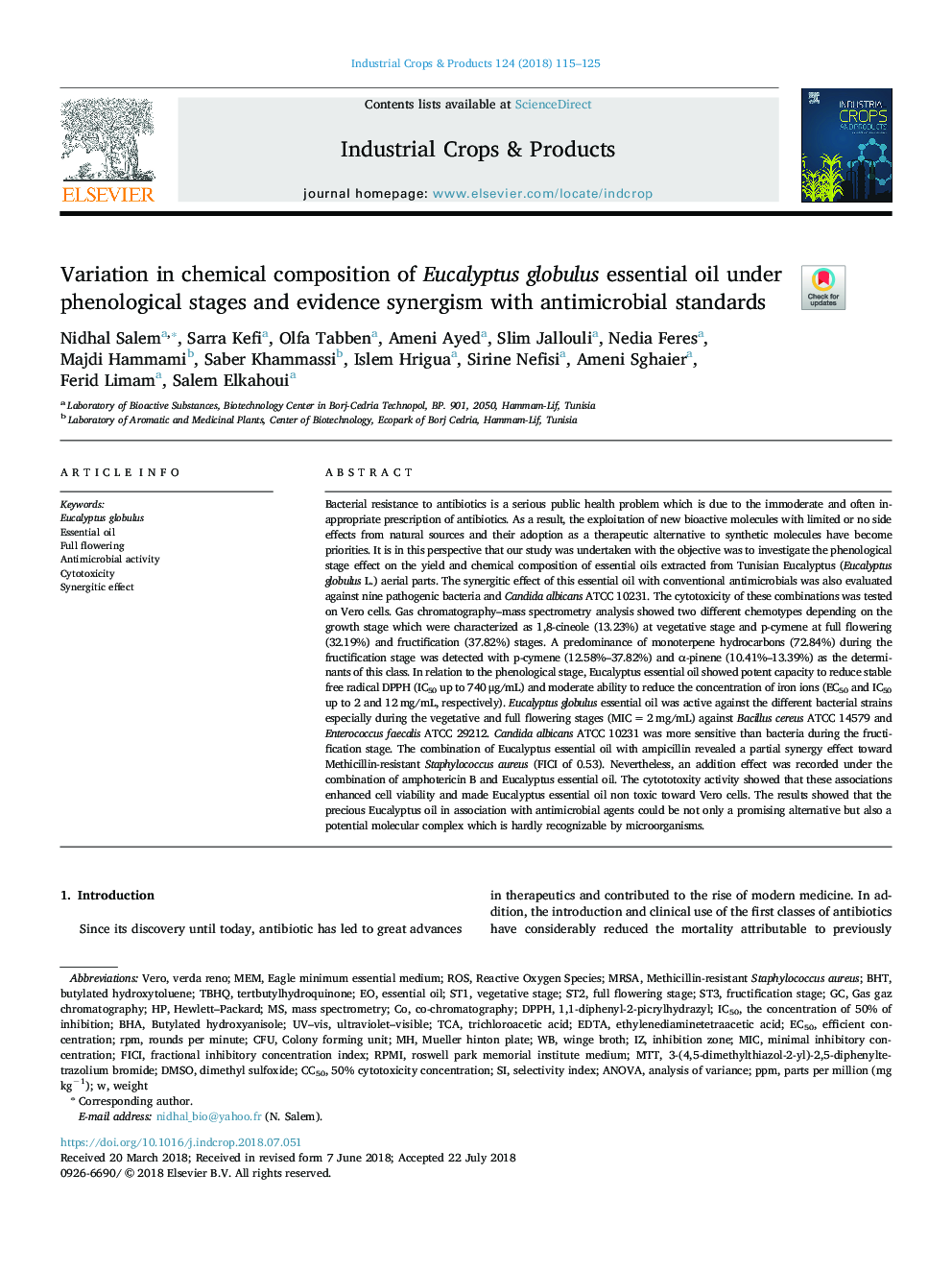| کد مقاله | کد نشریه | سال انتشار | مقاله انگلیسی | نسخه تمام متن |
|---|---|---|---|---|
| 8879468 | 1624786 | 2018 | 11 صفحه PDF | دانلود رایگان |
عنوان انگلیسی مقاله ISI
Variation in chemical composition of Eucalyptus globulus essential oil under phenological stages and evidence synergism with antimicrobial standards
ترجمه فارسی عنوان
تغییرات در ترکیب شیمیایی اسانس اکالیپتوس گلوبولوس در مراحل فنولوژیک و هم افزایی شواهد با استانداردهای ضد
دانلود مقاله + سفارش ترجمه
دانلود مقاله ISI انگلیسی
رایگان برای ایرانیان
کلمات کلیدی
ST1ppmMICTCAIC50BHAEC50RPMBHTRPMIDPPHST2CC50CFUTBHQ1,1-diphenyl-2-picrylhydrazyl - 1،1-دیفنیل-2-پریکیل هیدرازیل3-(4,5-dimethylthiazol-2-yl)-2,5-diphenyltetrazolium bromide - 3- (4،5-dimethylthiazol-2-yl) -2،5-difenyltetrazolium bromideDMSO - DMSOFICI - FICMTT - MTTROS - ROSUV–Vis - UV-VisEDTA - اتیلن دی آمین تترا استیک اسید Ethylenediaminetetraacetic acid - اتیلینیدامین تتراستیک اسیدMRSA - استافیلوکوک اورئوس مقاوم به متی سیلین یا MRSA methicillin-resistant Staphylococcus aureus - استافیلوکوک اورئوس مقاوم به متیسیلینtrichloroacetic acid - اسید ترشکلراکتیکUltraviolet–visible - اشعه ماوراء بنفش قابل مشاهده استEucalyptus globulus - اوکالیپتوس گلوبولوسanalysis of variance - تحلیل واریانسANOVA - تحلیل واریانس Analysis of varianceMinimal inhibitory concentration - حداقل غلظت مهار کنندهrounds per minute - دور در دقیقهDimethyl sulfoxide - دیمتیل سولفواکسیدCytotoxicity - سمیت سلولیselectivity index - شاخص انتخابیFractional inhibitory concentration index - شاخص غلظت مهار کننده مکررMass spectrometry - طیف سنجی جرمیEssential oil - عطرمایه یا اسانسAntimicrobial activity - فعالیت ضدمیکروبیMEM - مامانInhibition zone - منطقه مهارRoswell Park Memorial Institute medium - موسسه خاطرات Roswell Park mediumbutylated hydroxyanisole - هیدروکسی آنیزول باتلاقیbutylated hydroxytoluene - هیدروکسی تورولین باتلاقیVero - وروWeight - وزنcolony forming unit - کلنی واحد تشکیلReactive oxygen species - گونههای فعال اکسیژن
موضوعات مرتبط
علوم زیستی و بیوفناوری
علوم کشاورزی و بیولوژیک
علوم زراعت و اصلاح نباتات
چکیده انگلیسی
Bacterial resistance to antibiotics is a serious public health problem which is due to the immoderate and often inappropriate prescription of antibiotics. As a result, the exploitation of new bioactive molecules with limited or no side effects from natural sources and their adoption as a therapeutic alternative to synthetic molecules have become priorities. It is in this perspective that our study was undertaken with the objective was to investigate the phenological stage effect on the yield and chemical composition of essential oils extracted from Tunisian Eucalyptus (Eucalyptus globulus L.) aerial parts. The synergitic effect of this essential oil with conventional antimicrobials was also evaluated against nine pathogenic bacteria and Candida albicans ATCC 10231. The cytotoxicity of these combinations was tested on Vero cells. Gas chromatography-mass spectrometry analysis showed two different chemotypes depending on the growth stage which were characterized as 1,8-cineole (13.23%) at vegetative stage and p-cymene at full flowering (32.19%) and fructification (37.82%) stages. A predominance of monoterpene hydrocarbons (72.84%) during the fructification stage was detected with p-cymene (12.58%-37.82%) and α-pinene (10.41%-13.39%) as the determinants of this class. In relation to the phenological stage, Eucalyptus essential oil showed potent capacity to reduce stable free radical DPPH (IC50 up to 740âμg/mL) and moderate ability to reduce the concentration of iron ions (EC50 and IC50 up to 2 and 12âmg/mL, respectively). Eucalyptus globulus essential oil was active against the different bacterial strains especially during the vegetative and full flowering stages (MICâ=â2âmg/mL) against Bacillus cereus ATCC 14579 and Enterococcus faecalis ATCC 29212. Candida albicans ATCC 10231 was more sensitive than bacteria during the fructification stage. The combination of Eucalyptus essential oil with ampicillin revealed a partial synergy effect toward Methicillin-resistant Staphylococcus aureus (FICI of 0.53). Nevertheless, an addition effect was recorded under the combination of amphotericin B and Eucalyptus essential oil. The cytototoxity activity showed that these associations enhanced cell viability and made Eucalyptus essential oil non toxic toward Vero cells. The results showed that the precious Eucalyptus oil in association with antimicrobial agents could be not only a promising alternative but also a potential molecular complex which is hardly recognizable by microorganisms.
ناشر
Database: Elsevier - ScienceDirect (ساینس دایرکت)
Journal: Industrial Crops and Products - Volume 124, 15 November 2018, Pages 115-125
Journal: Industrial Crops and Products - Volume 124, 15 November 2018, Pages 115-125
نویسندگان
Nidhal Salem, Sarra Kefi, Olfa Tabben, Ameni Ayed, Slim Jallouli, Nedia Feres, Majdi Hammami, Saber Khammassi, Islem Hrigua, Sirine Nefisi, Ameni Sghaier, Ferid Limam, Salem Elkahoui,
